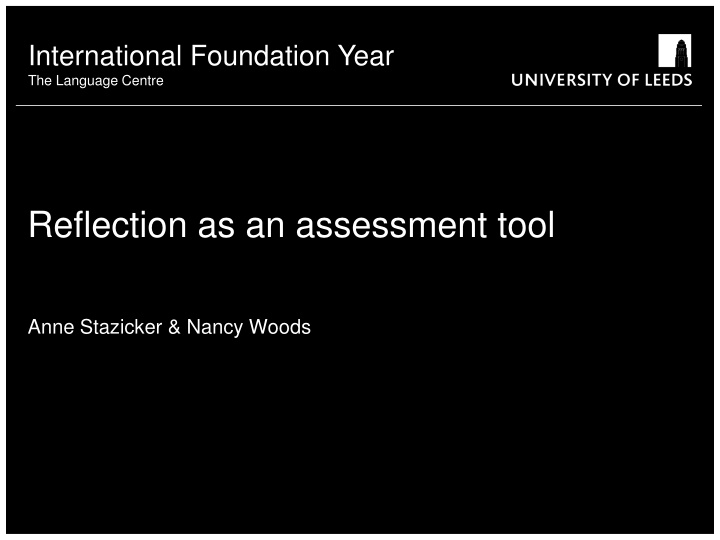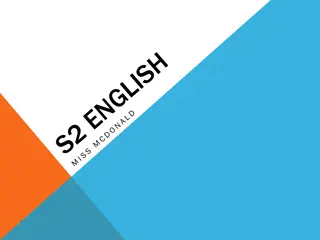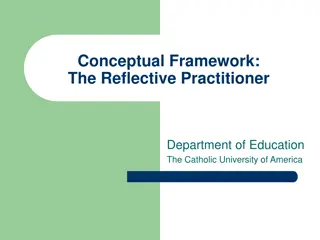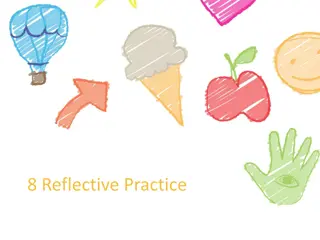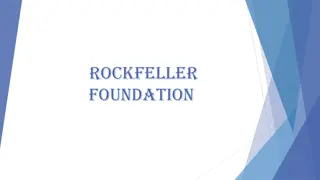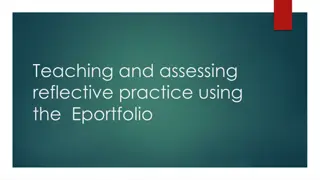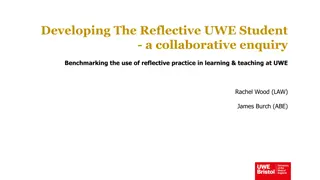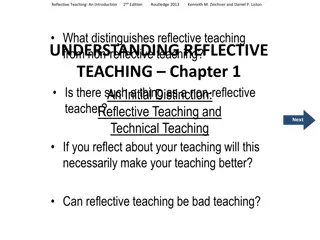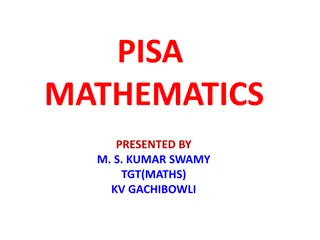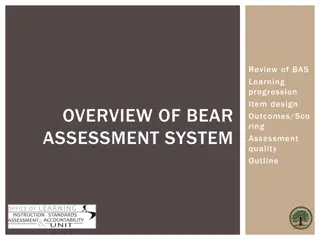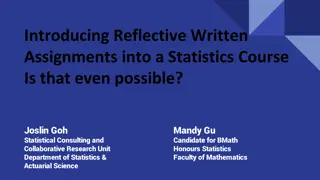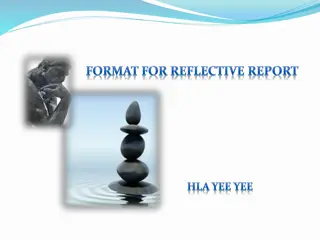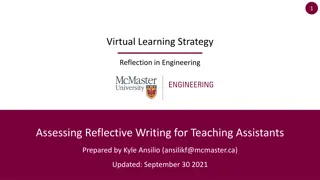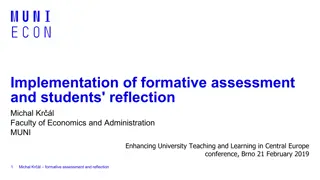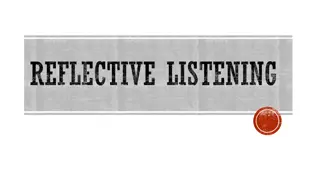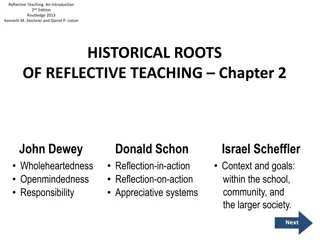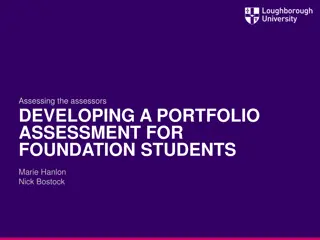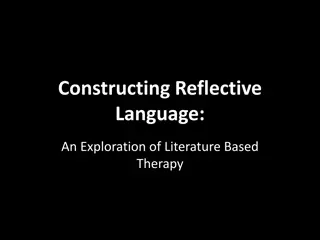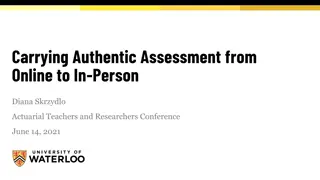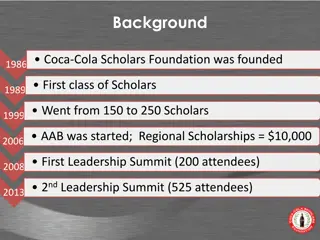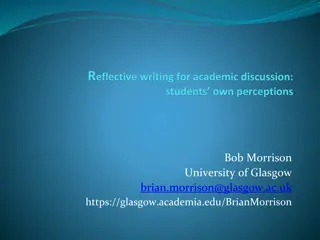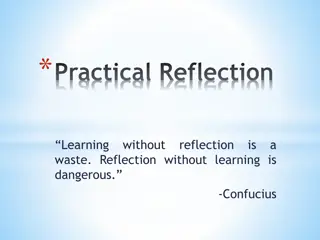Enhancing Foundation Year Student Skills Through Reflective Assessment
This comprehensive study explores the challenges in teaching Foundation Year students and introduces a reflective assessment tool to enhance critical thinking, autonomy, and academic skills. The initiative involved implementing a reflective journal task, assessing student progress, and encouraging self-directed learning. Strategies for promoting student engagement, responsibility, and effective learning approaches are discussed along with the benefits and challenges observed by both students and tutors.
Download Presentation

Please find below an Image/Link to download the presentation.
The content on the website is provided AS IS for your information and personal use only. It may not be sold, licensed, or shared on other websites without obtaining consent from the author.If you encounter any issues during the download, it is possible that the publisher has removed the file from their server.
You are allowed to download the files provided on this website for personal or commercial use, subject to the condition that they are used lawfully. All files are the property of their respective owners.
The content on the website is provided AS IS for your information and personal use only. It may not be sold, licensed, or shared on other websites without obtaining consent from the author.
E N D
Presentation Transcript
International Foundation Year The Language Centre Reflection as an assessment tool Anne Stazicker & Nancy Woods
Question In your experience what are the two most difficult skills to teach Foundation Year students? Critical thinking Speaking Reading Essay planning and structuring Becoming autonomous Referencing Paraphrasing Academic style Note-taking
The starting point BALEAP competencies : 6: Student Critical Thinking Show how students review and evaluate their own learning aims/materials/ activities/assessments in terms of usefulness for future study 7: Student Autonomy demonstrate the promotion of student choice/active engagement/ reflection/students taking responsibility in syllabus/tasks/lesson plans/materials (BALEAP, 2008)
Overview o Why we decided to start the reflective journal o Description of the task and how it was set up o Why we decided to assess it and how we did it o Successes and challenges (for both students and tutors)
Reasons for starting a reflective journal We wanted to encourage students to read tutor assessment feedback make connections have a responsible attitude develop good learning strategies = Autonomy/Critical thinking
Description and set up 2 part task: Record of learning : 2 activities per month (12 minimum) Reflective Journal: pre- and post- assessment reflections One feeds into the other VLE Personal tutor support/comments Suggested materials on VLE (Academic Word List) Self Access Area Workshops
Why assess? To encourage motivation Reward for effort Fit in with departmental assessment procedures
How it is assessed 5% of final grade 2 part assessment: Feedback end of semester 1 Feedback and mark end of semester 2 Single marked by personal tutor Standardisation Criteria
Challenges for students It was not so good of an assignment, it was a bit hard keeping up with it , but at the same time I ve learned a number of new things . It s a waste of time. I think as academic students we have more important things to take care of. People have friends to speak to about their problems and progress, because when you talking to friends it always has a tendency to spark competition . I found this portfolio task tedious if anything. I really felt it wasn t necessary to developing my academic English skills. If anything this took away from my studies on my other modules.
Challenges for tutors Time to check and comment Unwieldy VLE system Marking load Consistency ( quantity of guidance/comments in feedback matching criteria)
Successes for students End of semester student feedback: I do not think I would have done these self study tasks on my own so I think it was a good idea to make it an assessed task and I will continue to develop my skills further in my spare time. It has also helped me with becoming better at managing my time . I think it has helped me with my summarising skills and my vocabulary skills as well as my ability to critical think . I think it was helpful for me to improve my skill after the bad mark I have take in the first semester .
Successes for tutors External examiner comments: The reflective journal has been further developed since its introduction last year and its attempts to foster a degree of self reflection on each learner as well as transferring the responsibility for skills development to the students themselves . It allowed opportunities for timely intervention where necessary. Monitoring of this was sensitive and non-intrusive . Increased participation in voluntary workshop sessions/visits to Self Access Area.
Improvements for 2014 Reduced number of reflections. Improved VLE system? Higher percentage of mark 15% split over 2 semesters. More tailored workshops. More initial tutor support.
Limitations How can you prove that this is an effective learning tool? References: BALEAP . 2008. BALEAP[ British Association for Lecturers in English for Academic Purposes] Competency Framework for Teachers of English for Academic Purposes. Available at: http://www.baleap.org.uk/projects/eap-teacher-competencies [Accessed 28th March 2013].
Contact us Nancy Woods: n.a.woods@leeds.ac.uk Anne Stazicker: llcas@leeds.ac.uk
